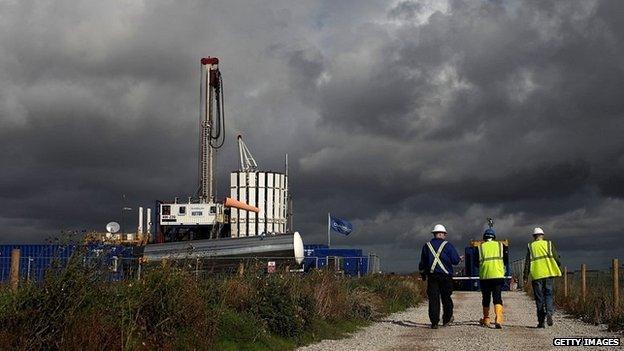'Low health risk' from fracking, says UK agency
- Published
- comments

The risks to public health from fracking for shale gas are low, according to a new official report.
Any problems publicised so far - such as in the US - are the result of operational failure or poor regulation.
The study, by Public Health England, an agency of the Department of Health, reviewed the latest research.
It focused on the risks of emissions of the chemicals used in fracking and radioactive material released with the gas.
The central conclusion is that "potential risks to public health from exposure to the emissions associated with shale gas extraction are low if the operations are properly run and regulated".
The report recommends environmental monitoring through the lifetime of any project and public disclosure of chemicals used in the fracking fluid.
The findings have been welcomed by the government which is pressing for the development of shale gas in the UK.
Environmental campaigners opposed to fracking say the study highlights the risks and the lack of oversight.
So far exploratory fracking has been limited to one site in Lancashire but the British Geological Survey (BGS) estimates UK shale could yield 150 billion cubic metres of gas, so commercial interest is growing.
US example
The report draws on American research to conclude that though pollutants can enter the air from gas flaring or leaks, "these emissions are relatively small, intermittent and certainly not unique to shale gas extraction…"
One quoted study - from the Barnett Shale in Texas in 2010 - found 70 individual volatile organic compounds including ethane, propane, butane and pentanes close to shale gas activity but observed these to be "localised" and significantly diminished downwind.
But the authors recognise that there is relatively little evidence to go on - the only detailed peer reviewed study of the impact of air emissions was published last year by the Colorado School of Public Health.
That work found that people living within half-a-mile of gas wells had an elevated risk of health conditions including neurological and respiratory effects.
However the Colorado study was criticised for having a small sample size and the Public Health England report says local weather and topography may mean that similar results may not be likely in Britain.
The PHE report acknowledges that extracting shale gas could produce residues containing naturally-occurring radioactive materials - but it argues that these risks would be similar to those in the existing oil and gas industry.
On the dangers of groundwater being contaminated, the study quotes a 2011 paper by MIT researchers who found that nearly half of 43 pollution incidents were related to drilling operations - mainly because of faulty sealing of wells.
Homework marks
According to the PHE study, American experience points to surface spills of chemicals being the most likely to affect water sources.
However it points out that 99% of drinking water in England comes from heavily-regulated water companies so the risk is "considered minimal". The remainder who get their water from private wells are "particularly vulnerable" - but "high quality well integrity" should protect water sources.
Another risk examined is from the chemicals used in the fracking process. An American study found 75% of them could affect skin, eyes and breathing while 25% are carcinogenic.
For that reason, the PHE study calls for full disclosure of the chemicals used and strict enforcement of chemicals handling and of well design.
Overall, the study concludes that the well-publicised problems experienced in the US may not be replicated in the UK because of differences in geology, operation and regulation.
The energy minister Michael Fallon welcomed the findings.
"The UK has the most robust regulatory regime in the world for shale gas and companies will only be granted permission to frack for shale if their operations are safe," he said.
However Greenpeace campaigner Leila Deen said the report was a "timely reminder" of the risks of fracking and the potential long-term health impacts.
"The government has so far responded to these risks by cutting the budget of the environmental regulator and effectively allowing companies to mark their own homework when it comes to monitoring."